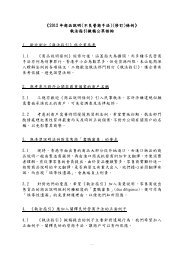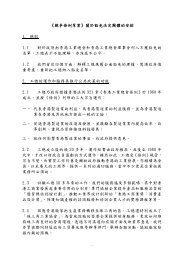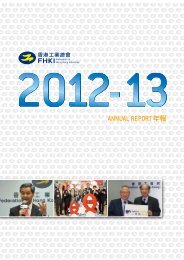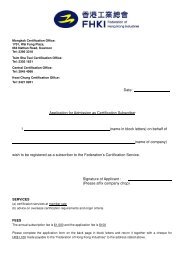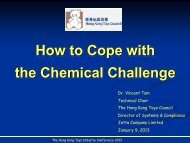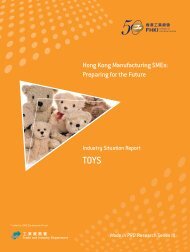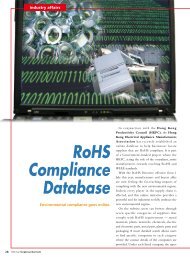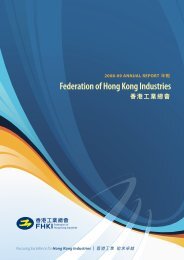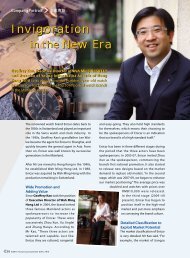116Conclusions<strong>Hong</strong> <strong>Kong</strong> manufacturing <strong>SMEs</strong> face manyissues going <strong>for</strong>ward. These include uncertainglobal markets, rising costs in <strong>the</strong>ir traditionalproduction locations, changes in legal andregulatory environments, an increasingly difficultcompetitive environment, Chinese MainlandPolicies affecting operations in <strong>the</strong> Mainland, anda host of operational and strategic issues. All of<strong>the</strong> issues identified above are significant in and of<strong>the</strong>mselves, but <strong>the</strong>y must also be put into properperspective and context in order to understandwhat <strong>the</strong> future may hold.Perspectives on Key IssuesThe global economy has been experiencing adownturn, but <strong>the</strong> global economic environmenthas actually been quite good <strong>for</strong> most of <strong>the</strong> last30 years. The RMB is under pressure to appreciate,but <strong>the</strong> consensus among economists everywhereexcept <strong>the</strong> Chinese Mainland has been that it hasbeen severely undervalued <strong>for</strong> a long time. Labourcosts are rising in <strong>the</strong> Chinese Mainland, but <strong>for</strong>well over a decade previously <strong>the</strong>y were virtuallyunchanged in real terms. Utility costs are rising inChina, but some utility prices, like electricity arestill well below global norms. Legal and regulatorychanges in China are affecting <strong>Hong</strong> <strong>Kong</strong> <strong>SMEs</strong>operating in <strong>the</strong> Mainland, but <strong>the</strong> Chinese legaland regulatory system allowed <strong>the</strong>m to set upand operate in <strong>the</strong> first place. The competitiveenvironment is becoming tougher, but it was <strong>the</strong>initial lack of Mainland companies with knowledgeof processes, products, and markets that allowedmany <strong>Hong</strong> <strong>Kong</strong> companies to become establishedin <strong>the</strong> first place. Chinese policies about industrialdevelopment are affecting SME operations in <strong>the</strong>Mainland, but again Chinese development policiesallowed <strong>the</strong> <strong>Hong</strong> <strong>Kong</strong> firms to set up as well.<strong>SMEs</strong> by <strong>the</strong>ir nature face strategic and operationalissues, but successful <strong>SMEs</strong> find ways to overcome<strong>the</strong>se issues.Some interviewees expressed a view that <strong>Hong</strong><strong>Kong</strong> manufacturing companies, particularly <strong>SMEs</strong>,became established through a particular set ofcircumstances that may indeed change <strong>for</strong>ever. Ifso, <strong>the</strong>n many <strong>Hong</strong> <strong>Kong</strong> manufacturing <strong>SMEs</strong>will face difficult times. However, with changealso comes opportunity. It will be <strong>the</strong> ability andwillingness of <strong>the</strong> <strong>Hong</strong> <strong>Kong</strong> companies to changeand to exploit existing and new opportunities thatwill determine <strong>the</strong>ir future.Looking Back<strong>Hong</strong> <strong>Kong</strong> industry has evolved enormously over<strong>the</strong> last few decades. Thirty years ago, few wouldhave imagined <strong>the</strong> important role that <strong>Hong</strong> <strong>Kong</strong>industrial corporations would play in today’s globaleconomy. Fewer still would have imagined that<strong>the</strong> key to this importance would not be artificiallytrying to keep industrial activities within <strong>Hong</strong><strong>Kong</strong>, but ra<strong>the</strong>r it would be adjusting to changingcircumstances and pioneering new productionlocations outside of <strong>Hong</strong> <strong>Kong</strong>. This is just oneexample of <strong>the</strong> constant reinventing of <strong>Hong</strong> <strong>Kong</strong>industry that has occurred over <strong>the</strong> period.Looking back, <strong>the</strong> success of <strong>Hong</strong> <strong>Kong</strong> industryhas depended on its ability to take advantage ofopportunities resulting from major developmentsin <strong>the</strong> global economy, such as reduction of tradebarriers, increasing affluence in global markets,improvements in transportation and communicationtechnology, containerisation, <strong>the</strong> emergence ofmodern supply chains, <strong>the</strong> separation of productionfrom o<strong>the</strong>r corporate activities, and <strong>the</strong> reintegrationof <strong>the</strong> Chinese Mainland into <strong>the</strong> worldeconomy. Similarly, looking <strong>for</strong>ward, <strong>the</strong> successof <strong>Hong</strong> <strong>Kong</strong> industry will depend on its abilityto take advantage of opportunities resulting fromfuture developments in <strong>the</strong> global economy. It<strong>the</strong>re<strong>for</strong>e makes sense to project what some of<strong>the</strong>se developments might be.
117New OpportunitiesOne major development going <strong>for</strong>ward will be <strong>the</strong>rise of consumer markets in <strong>the</strong> Chinese Mainland.By <strong>the</strong> middle of this century, <strong>the</strong> Chinese Mainlandwill have <strong>the</strong> world’s largest economy by asignificant margin. According to some estimates,Chinese consumer demand accounts <strong>for</strong> around sixper cent of global consumer demand today, but isexpected to rise to over 25 per cent by 2025, andits share will continue to grow <strong>the</strong>reafter. Whatwill be <strong>the</strong> world’s largest market is right on <strong>Hong</strong><strong>Kong</strong>’s doorstep, and it will be a market in which<strong>Hong</strong> <strong>Kong</strong> companies have had production ando<strong>the</strong>r activities since <strong>the</strong> 1980s. Yes, <strong>the</strong>re will beintense competition in <strong>the</strong> China market, fromChinese companies and from companies from allover <strong>the</strong> world, but <strong>the</strong> China market still will offerenormous opportunities <strong>for</strong> <strong>Hong</strong> <strong>Kong</strong> industry,and some <strong>Hong</strong> <strong>Kong</strong> companies will undoubtedlygrow large serving something <strong>the</strong>y have never hadbe<strong>for</strong>e, a huge domestic market.By <strong>the</strong> middle of <strong>the</strong> century, <strong>the</strong> Chinese Mainlandwill also be by far <strong>the</strong> world’s leading industrialcountry. The industrial sectors in <strong>the</strong> OECDcountries are diminishing in relative importance andeven though costs will rise in China and resourceswill become somewhat constrained, <strong>the</strong>re is simplyno o<strong>the</strong>r country, or even set of countries, thatwill have <strong>the</strong> population, <strong>the</strong> infrastructure, and<strong>the</strong> international supply chains necessary to keepup with China. Sou<strong>the</strong>ast Asian countries are toosmall and will saturate be<strong>for</strong>e <strong>the</strong>y become truecompetitors to China. India will have decades worthof infrastructure to construct, educational policiesto develop, and regional geo-political problemsto resolve. Africa is too fragmented and lags toofar behind. The world’s largest industrial economywill be right on <strong>Hong</strong> <strong>Kong</strong>’s doorstep, but it willnot be <strong>the</strong> same industrial economy we see today.Instead, as cost pressures mount on <strong>the</strong> coast andinfrastructure improves in <strong>the</strong> interior, we will seea much more geographically balanced productionprofile around China and companies managing anindustrial portfolio in China will need to manage inmore than a single location.Ano<strong>the</strong>r major development will be closer economicintegration between <strong>Hong</strong> <strong>Kong</strong> and <strong>the</strong> ChineseMainland. By <strong>the</strong> middle of <strong>the</strong> century, <strong>Hong</strong><strong>Kong</strong> and <strong>the</strong> Mainland may have decided that“one-country, two-systems” has been so useful toboth sides that it should be retained in some <strong>for</strong>mor ano<strong>the</strong>r even beyond 2047. Certainly, DengXiaoping once stated that such might be <strong>the</strong> case.No matter what <strong>the</strong> exact circumstances of <strong>the</strong>political situation at <strong>the</strong> time, in economic terms<strong>the</strong>re is likely to be complete or nearly completeintegration by <strong>the</strong> middle of <strong>the</strong> century. Theintegration will be facilitated by arrangements suchas CEPA, <strong>the</strong> <strong>Hong</strong> <strong>Kong</strong>-Guangdong FrameworkAgreement, and <strong>the</strong>ir successors. It will also befacilitated by infrastructure such as <strong>the</strong> <strong>Hong</strong> <strong>Kong</strong>-Zhuhai-Macao Bridge and <strong>the</strong> linking of <strong>Hong</strong><strong>Kong</strong> with <strong>the</strong> national high speed rail network.Closer economic integration with <strong>the</strong> ChineseMainland means that <strong>Hong</strong> <strong>Kong</strong> industry is likelyto be far more diverse than it is today, as <strong>Hong</strong><strong>Kong</strong> will be a prime location <strong>for</strong> headquarters,management, finance, marketing, sales, corporatecommunications, design, research, and logistics,not just <strong>for</strong> traditional <strong>Hong</strong> <strong>Kong</strong> companies, but<strong>for</strong> companies originating in <strong>the</strong> Chinese Mainland,elsewhere in Asia, and elsewhere in <strong>the</strong> world. Thediversity will be reflected not only in <strong>the</strong> locationof origin of companies that will ei<strong>the</strong>r move to<strong>Hong</strong> <strong>Kong</strong> or carry out important functions in<strong>Hong</strong> <strong>Kong</strong>, but also in <strong>the</strong> industrial mix as <strong>the</strong>full industrial diversity that will be present inSouth China will be reflected by companies with apresence in <strong>Hong</strong> <strong>Kong</strong> as well.A n o t h e r m a j o r d e v e l o p m e n t w i l l b e t h einternationalisation of companies from <strong>the</strong> ChineseMainland. Today, China’s outbound investment isdwarfed by its inbound investment. By <strong>the</strong> middle of<strong>the</strong> century, in all likelihood this situation will havebeen reversed, or at least <strong>the</strong> investment flows willbe far larger and better balanced. Despite commonbelief, <strong>the</strong> vast majority of China’s outboundinvestment to date has not been in <strong>the</strong> resourcesector, but in <strong>the</strong> service sector. This investment willset <strong>the</strong> stage <strong>for</strong> much larger outbound investments




